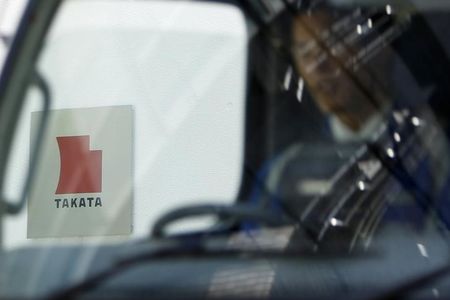By Yoko Kubota and Ben Klayman
TOKYO/DETROIT (Reuters) - Honda Motor Co (T:7267) and other Japanese automakers on Monday recalled almost 3 million cars with potentially explosive air bags supplied by Takata Corp <7312.T>, bringing the total recall so far to about 10.5 million vehicles over the past five years.
The series of recalls cover both passenger-side and driver-side air bags, which the world's second-biggest automotive safety parts maker manufactured in 2000-02. The total ranks it among the five biggest recalls in the industry's history.
And the tally is expanding further as Honda and six other automakers also said on Monday they were recalling more vehicles in some high humidity regions in the United States, in what they called a "field action", at the request of the National Highway Traffic Safety Administration (NHTSA) to replace Takata air bag inflators.
In the wider action, Honda said it was recalling about 2.03 million vehicles globally over potentially flawed Takata air bag inflators made in 2000-02 with a risk of exploding and shooting out shrapnel at drivers and passengers, expanding a recall from April 2013. It cited how explosive material used to inflate Takata passenger-side air bags had been handled and processed in 2000-02 at plants in the United States and Mexico.
Nissan Motor Co (T:7201) said it would recall 755,000 vehicles worldwide, while Mazda Motor Corp (T:7261) said it would call back 159,807 vehicles, both also expanding April 2013 recalls.
Takata Chief Executive Officer Shigehisa Takada and Chief Operating Officer Stefan Stocker said the company was working with safety regulators and car makers. "We will aim to further strengthen our quality control system and work united as a company to prevent problems from happening again," they said in a statement.
A Takata spokeswoman said it was unclear what the financial impact of the recalls would be, but last year's recalls cost the supplier $300 million. The 2013 recalls were intended to close the book on a problem that emerged as early as 2007 and has been linked to two deaths.
Separately, Honda, Toyota, Nissan, Mazda, Ford, Chrysler and BMW said they are conducting regional recalls in the United States to replace Takata air bag inflators in certain vehicles in high humidity regions of Puerto Rico, Florida, Hawaii and the Virgin Islands. Most of the companies said NHTSA had determined the regions affected, when asked why other humid areas were not covered.
However, Honda is also recalling affected vehicles in Alabama, Georgia, Louisiana, Mississippi, South Carolina and Texas.
Ford said it was recalling 58,669 vehicles, including certain 2005-2007 model Mustang cars, 2005-2006 model GTs and 2004 Ranger pickup trucks. Mazda said the recall affects about 34,600 vehicles, including 2003-2006 Mazda6, 2004-2008 RX8 and 2006-2007 MazdaSpeed6 cars, and 2004 MPVs. None of the other automakers have determined the number of vehicles affected.
NHTSA did not have an immediate comment.
Nissan said it is determining which models are affected by the recall. A Chrysler spokesman said the 2006 Dodge Charger was the affected model but the scope beyond that has not been determined. BMW said 2001-2006 model year 3 Series cars were affected, while a wide range of Honda models were covered.
TURNING OFF AIR BAGS
The recalls come as General Motors (N:GM) is under scrutiny over why it took more than a decade to discover a faulty ignition switch linked to at least 13 deaths.
Monday's global recalls by Honda, Mazda and Nissan follow Toyota's recall last week.
Prior to Monday, the four Japanese car makers and BMW (DE:BMWG) had recalled 7.6 million vehicles equipped with potentially defective air bags.
Short of Takata replacement parts, the automakers said they would turn off air bags in Japan as customers bring recalled vehicles into dealerships - judging that an inoperable passenger side air bag is safer than a potentially defective one.
In the United States, NHTSA opened a probe earlier this month on whether Takata inflators made after 2002 are prone to fail, and whether driving in high humidity contributes to the risk of air bag explosions.
In a June 11 letter to the NHTSA, Takata said it would support "regional campaigns" to replace certain driver-side air bag inflators made between January 2004 and June 2007, as well as certain passenger-side inflators made between June 2000 and July 2004. Takata said it will support the replacement of those inflators in vehicles in high humidity areas of Puerto Rico, Florida, Hawaii and the Virgin Islands.

But it did not admit that there is any "safety defect" in the air bags, saying information currently available does not indicate that.
Among previous large-scale global recalls, about 14 million Ford vehicles were affected over a 10-year period to 2009 over a faulty cruise control deactivation switch. From 2009, Toyota recalled more than 9 million vehicles related to unintended acceleration and, in 2012, recalled more than 7.4 million vehicles to fix power window switches.
(Additional reporting by Chang-ran Kim and Ritsuko Ando in Tokyo, Bernie Woodall in Detroit; Editing by Ian Geoghegan, Louise Heavens and Tom Brown)
